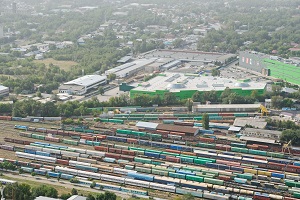
Enhancing connectivity and ensuring sustainable and efficient functioning of international transport corridors is of paramount importance for the economic recovery of landlocked countries of Central Asia and the Caucasus, especially during the COVID-19 crisis which caused serious disruptions of supply chains and mobility.
This was the resounding message as Ministers and high-level national representatives from Azerbaijan, Afghanistan, Kazakhstan, Kyrgyzstan, Tajikistan, Turkmenistan and Uzbekistan – members of the UN Special Programme for the Economies of Central Asia (SPECA) – and Georgia, came together with UN partners, Multilateral Development Banks and international organizations for a Regional Dialogue led by UNECE on 29 September 2020.
Officials identified the most urgent measures to be implemented to enhance regional connectivity and support national economies’ rapid recovery, in the face of a contraction of the regional economy by 4.7% in 2020, according to World Bank forecasts.
Conclusions adopted stressed the importance of regional cooperation to promote the development of integrated multimodal transport systems (especially railways and intermodal connections) and completing missing infrastructure links connecting the participating countries to regional and Euro-Asian corridors.
Officials called on countries that have not yet done so to consider acceding to and implementing the United Nations legal instruments on inland transport – administered by UNECE – to enhance regional transport connectivity and maintain undisrupted supply-chains affected by the COVID-19 pandemic to further support their economic recovery. Countries are encouraged to implement digital solutions for cross-border facilitation (especially e-TIR and e-CMR and cross-border transport facilitation tools) to minimize human contact and lower transport and trade costs and border crossing waiting times.
Accelerating implementation of existing SPECA transport connectivity initiatives and harnessing sub-regional transport cooperation through SPECA Working Group on Sustainable Transport, Transit and Connectivity was further emphasized as a priority. UNECE Executive Secretary Olga Algayerova urged countries to harness such cooperation to fully realize their potential as transit countries on strategic Euro-Asian inland transport corridors to drive progress towards the Sustainable Development Goals. Stressing the significant investments made so far in development of transport infrastructure and improved legislative and institutional frameworks, she emphasized the importance of UNECE tools for more efficient, safe and environmentally friendly transport.
Being a landlocked country means you are reliant on global and regional collaboration; countries cannot simply “go it alone”, stressed Ms. Fekita Utoikamanu, UN High Representative for Least Developed Countries, Landlocked Developing Countries & Small Island Developing States. “The pandemic has shown us, over and over, the critical importance of connectivity of all kinds”, she said.
H.E. Mr. Rashid Meredov, Deputy Chairman of the Cabinet Ministers, Minister of Foreign Affairs of Turkmenistan, emphasized “the importance of continuing our joint efforts to enhance the use of existing legal instruments on the facilitation of transport and transit procedures”, stressing the “key role of the Conventions and multilateral agreements developed within the UNECE”. Seizing this potential, Turkmenistan has recently acceded to six of these instruments.
“Safeguarding uninterrupted supply chains through sustainable international transport and transit corridors is like preventing economic heart attacks. Establishing seamless and smooth flow of goods will reduce costs, stimulate demand and revitalize the economy”, said Ms. Gwi Yeop Son, UN Development Coordination Office Regional Director for Europe and CIS.
The dialogue’s conclusions encourage SPECA countries to keep transport supply chains going during the pandemic, especially for essential goods and services – including medical supplies, food products and ICT. Countries further stressed the need for regular exchange of information and continuous dialogue to ensure uninterrupted transport connectivity.
For more information, please visit: http://www.unece.org/trans/transmeetings/transport-events/events/2020/strengthening-transport-connectivity-in-the-speca-region-and-beyond-in-the-era-of-covid-19/doc.html

